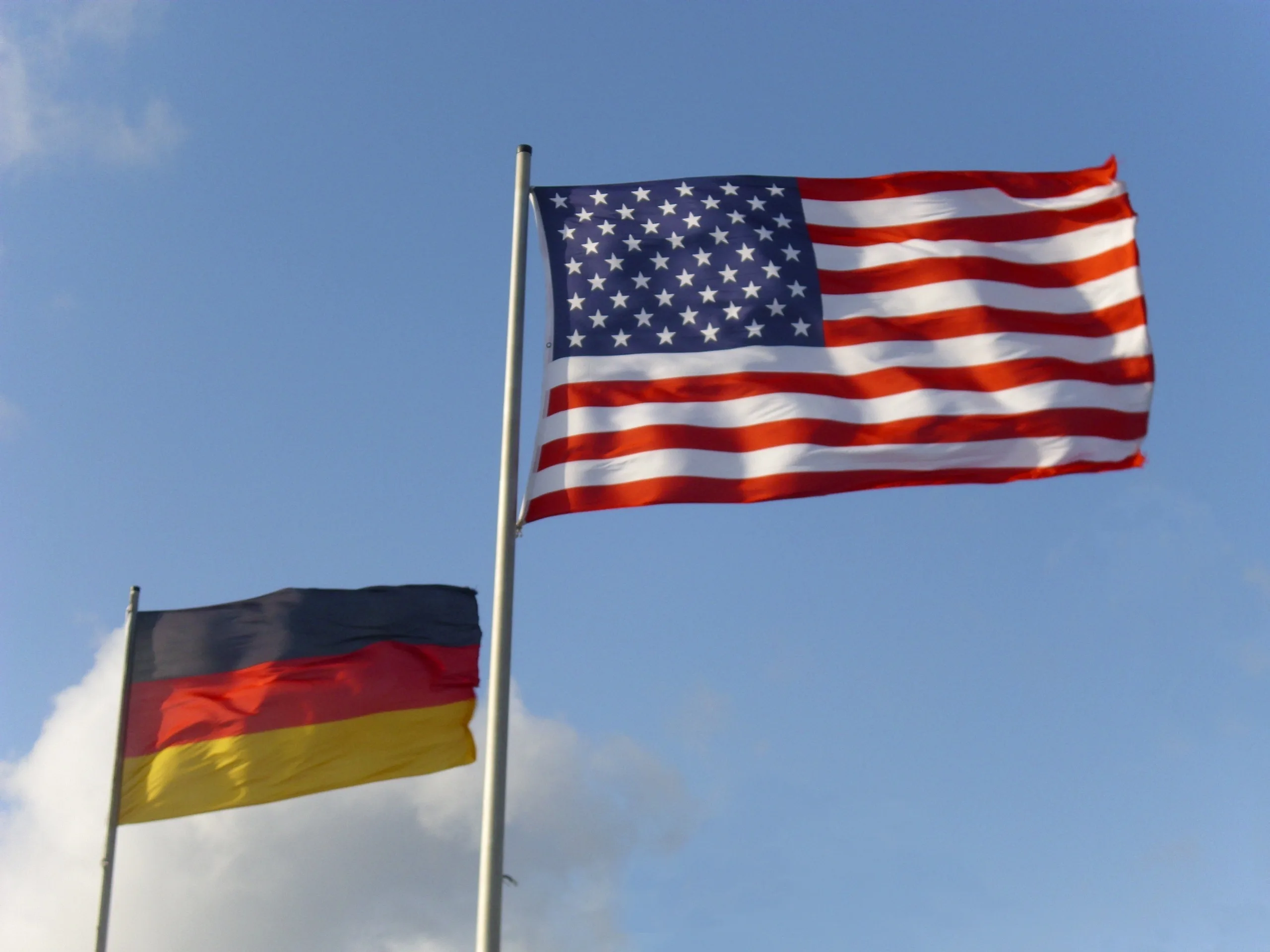Surplus war
Germany’s current-account surplus is a problem
But not for the reasons Donald Trump thinks it is
WHAT awkward timing. On February 9th Germany reported the world’s largest current-account surplus, of about €270bn (almost $300bn), beating even China’s. Meanwhile, the country with the world’s biggest deficit remains America, which under its new president, Donald Trump, is browbeating friend and foe alike in the name of putting “America first”. Mr Trump’s economic adviser, Peter Navarro, has even accused Germany of currency manipulation. By his logic, Germany “exploits” America and others because it uses the euro, which is weaker today than the old Deutschmark would be, making German cars, machines and other exports more competitive.
Coming just weeks after Mr Trump casually threatened to slap a 35% tariff on imported BMWs, such talk has Germans’ full attention. His verbal assaults on the rules-based trading order, along with his disdain for NATO and the European Union, strike at the heart of post-war Germany’s identity and national interest, which is to be embedded in Europe and the West as a peaceful mercantile nation. But if Mr Trump thinks the angst he is causing gives him bargaining power over Germany, he is naive.
His administration’s mistake is to attack Germany with flawed logic. Yes, the euro is weak relative to the dollar. But so are other currencies. Germans think Mr Trump has only himself to blame. He has promised huge tax cuts and increases in infrastructure spending, which will drive up interest rates in America, boosting the dollar. Mr Navarro’s suggestion that Germany deliberately attempts to weaken the euro makes no sense. The European Central Bank (ECB) may be based in Frankfurt. But its president, Mario Draghi, is keeping interest rates near zero and buying bonds (in the European version of “quantitative easing”) primarily to stimulate economies outside Germany.
Indeed, German economists and pundits are Mr Draghi’s most vocal critics. They have complained for years that low interest rates rob German savers and ruin German life insurers. If the government shows restraint in criticising Mr Draghi, that is thanks to another German tradition: respect for the independence of central bankers. When Mr Draghi began loosening monetary policy, “I told him he would drive up Germany’s export surplus,” Wolfgang Schäuble, Germany’s finance minister, told Tagesspiegel, a German newspaper. “I promised then not to criticise this course publicly. But I do not then want to be criticised for the consequences of this policy.”
By choosing the wrong line of reasoning, Mr Trump has unwittingly let the Germans off the hook in a more fundamental debate. After all, Germany’s trade surpluses have been controversial for years. Long before Mr Trump ran for office, the European Commission in Brussels, the International Monetary Fund in Washington, America’s treasury department and the OECD, a club of mostly rich countries, were already berating Germany for causing imbalances in the European and global economies.
The real German problema
Their analysis starts more than a decade ago, when German employers and unions agreed to restrain wage growth. Workers weren’t thrilled, but everyone agreed that Germany was not competitive enough. This amounted to a devaluation of Germany within the euro zone. The best way out of today’s imbalances, economists say, is not to keep cutting wages in down-and-out countries like Greece, but to let them rise in Germany. Wages have been going up—by 2.3% last year—but should grow faster.
The other factor is that Germans, in an ageing society, have for years been saving much more than they invest. Individuals are filling piggy banks for their retirement. And firms, expecting lower returns from older, smaller populations in the future, are investing abroad instead of at home. At the same time, the government, also citing demography, in 2011 adopted a “debt brake”, limiting its new borrowing at just the moment when ultra-low interest rates would make debt service almost free. The resulting excess savings are capital that Germany sends abroad. They are the corollary of Germany’s current-account surpluses.
There is a case that Germany invests too little. Marcel Fratzscher, an economist, estimates this “investment gap” at €100bn annually. Many in the centre-left Social Democratic party (SPD) agree with him. They include Martin Schulz, the SPD’s freshly chosen candidate for chancellor in the election scheduled for September 24th. He has jolted his party in the polls. The SPD is now roughly even with the centre-right bloc of Angela Merkel. Should Mr Schulz win, government spending could rise.
Other German economists, such as Clemens Fuest, doubt that the gap is big. In the 1990s, after reunification, investment soared as eastern Germany got new roads, buildings and plants. Eventually that exceptional spending had to end, says Mr Fuest, and recently Germany’s investment ratio has been stable. In 2015 it was 19.9%, a bit higher than the EU average. Boosting investment is a good idea, he thinks, but no realistic increase could reverse a current-account surplus that amounts to 9% of GDP.
If Germany really wanted to attack its surpluses, it would have to do something drastic, he thinks, such as lowering value-added tax (making goods cheaper, domestic or foreign) while raising payroll taxes (making only German labour dearer). But that is a non-starter politically. Another option is for the government to stop saving and start deficit-spending. But that too is anathema in the Berlin consensus. As the German campaign heats up, all sides are instead likely to praise the surplus as a sign of export prowess. Sigmar Gabriel, the foreign minister and a leading Social Democrat, gave a taste of this defiance when he responded to Mr Trump’s tariff threat by taunting America to “make better cars”. One day, when enough elderly Germans actually cash in their savings, German surpluses will turn to deficits. Until then, Germany’s policy stand-off with the world will continue.
This article appeared in the Europe section of the print edition under the headline “Surplus war”
